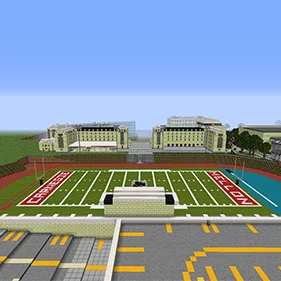Minecraft Mania

Jared Cohen used to spend hours in front of a screen in 2012, extracting raw materials and crafting tools on Minecraft, a year after the video game was first released. The rising sophomore thought his days of virtual world-building were long behind him, but an initiative from Hillel Jewish University Center of Pittsburgh during the coronavirus led him to rekindle his middle school hobby and take on his most ambitious Minecraft task yet: recreating his university’s campus.
Cohen, who studies material science and biomedical engineering at Carnegie Mellon University, is not alone in this pursuit. Hillel students across the country have been using Minecraft to foster school communities during this separation, and even model their own Hillel buildings.
For Cohen, his project began as a solo endeavor to pass the extra time on his hands, but quickly evolved into a community of students giving tours of the virtual world and helping to build it.
“I started going on the server to show people around, and a bunch of people started saying they really wanted to help build,” Cohen said. “I began delegating certain jobs and now, there are whole buildings on the server that I didn’t create at all, and they’re some of the best buildings on there. Rather than just look, people can participate now.”
Cohen, who serves as operations chair for Hillel JUC, was inspired to share videos of his Minecraft campus on Facebook for the Hillel JUC Quarantine Challenge, an engagement initiative where students share goals they’ve been working toward while on lockdown. After sharing the videos, Cohen felt his work was benefiting his peers during challenging times.
“I got a lot of praise from a lot of people saying how awesome the campus was, and that made me feel well integrated into the community, even though I didn’t know those people myself,” Cohen said. “It made me feel like I was making a positive contribution in such a difficult time.”
For Lauren Posklensky, a senior majoring in English at University of Vermont, recreating her campus helped give her days structure.
“It’s been hard to find the motivation for online classes because it’s hard to see the end goal when you’re at home,” Posklensky said. “It doesn’t feel like time is passing, and the days all blend together. On Minecraft, you can really see the progress of things getting built. It’s easier to have concrete goals.”
Over 150 students now work collectively to build UVM’s campus on Posklensky’s Minecraft server. Students hang out virtually in the dorms and are even planning to hold a graduation ceremony within the game.
“I heard that some students in Japan had held a virtual graduation in Minecraft, and I thought we could do that, too,” Posklesky said. “We’ve already had the university’s online graduation ceremony, and we’re hoping to hold our own Minecraft graduation soon.”
As for next steps, Posklensky hopes to begin creating UVM’s Hillel building, which opened at the start of this academic year.
“I go to Hillel events for holidays, like latkes for Chanukah and the Purim carnival, and I consider myself pretty good friends with all the people who work there,” Posklesky said. “Hopefully, we can build the Hillel building soon since we’ve just reached that part of campus. We can put some little inside jokes in there.”
While Cohen and Posklensky began recreating their campuses to regain a lost sense of community, Betzalel Shapiro, a rising senior studying marketing at Yeshiva University, started to build YU’s campus on Minecraft after realizing his desire for stronger communal ties once his campus reopens. Many of his buildings feature Jewish designs, including recreations of beit midrashim, Jewish study halls, around campus and a model of the Sfarim Sale, a Jewish book sale that students flock to each semester.
Shapiro hopes that sharing videos of the virtual buildings he’s made to the Yeshiva University Facebook group will raise his peers’ spirits.
“The biggest negative impact of coronavirus for me is probably the social isolation,” Shapiro said. “We’re not college students for long and this is where we are, and it’s maddening. We’re busy with school but we don’t get the social rewards of it. With this Minecraft campus, I’m trying to contribute to my college community online in a fun way, and hopefully it helps people stay connected to some degree.”